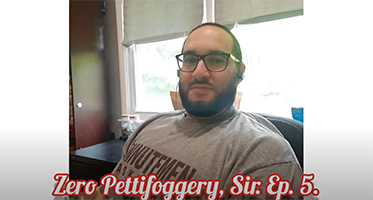The Latest In NJ Law:
October 30th, 2018 – An Update on the Bail Reform Act
The Supreme Court of the United States has declined to grant certiorari to a bail bonds underwriter and a criminal defendant challenging the constitutionality of the New Jersey Bail Reform Act. The case, Holland v. Rosen, presented the question as to whether the New Jersey law favoring non-monetary restrictions over monetary bail is an unnecessary restriction of pretrial liberty in violation of the Eighth Amendment, the Due Process Clause, and the Fourth Amendment. The Plaintiff, Brittan Holland, was facing charges for aggravated assault, was joined by Lexington National Insurance Company, an underwriter to bail bonds. More Info Here.
October 17th, 2018 – An Update on Municipal Court
The State of New Jersey Supreme Court has been holding hearings to elicit testimony and opinions on why older, minor municipal court complaints pending for more than Fifteen (15) years should be dismissed. The Administrative Order was released on July 17th, 2018 to address the efficiency of municipal courts.
In addressing that efficiency, the Court is considering the dismissal of these older and unresolved charges depending on the seriousness of the offense charged, the age of the case, and other relevant factors.
The New Jersey State Bar Association began drawing lines between Moving Violations and Non-Moving Violations in regards to their opinion as to what cases should be dismissed. They continued to differentiate between those Moving Violations that incur Driver’s License Points.
The Court will be distributing a list of cases to each Municipality that fall within the scope of the July 17th, 2018 Administrative Order and holding hearings on October 22nd, October 23rd, and October 24th. A resolution on the matter will likely take months to iron out. More Information Here.
September 9th, 2018 – An Update on the Juvenile Justice System
In 1974, Congress enacted the Juvenile Justice and Delinquency Prevention (JJDP) Act (Pub. L. No. 93-415, 42 U.S.C. § 5601 et seq.). This landmark legislation established the Office of Juvenile Justice and Delinquency Prevention to support local and state efforts to prevent delinquency and improve the juvenile justice system.
From 1974 to 2002, the OJJDP have focused their policy and practices including: the Formula Grants program, separation requirement, deinstitutionalization of status offenders requirement, prevention and treatment policy, jail removal requirements, addressing disproportionate minority confinement, adding programs to address gender bias, emphasize family strengthening, emphasize graduated sanctions, risk-need assessments, and so forth.
In related legislation, the Congress also passed the Omnibus Crime Control and Safe Streets Act, The Adoption Promotion Act of 2003, Child Abuse Prevention and Treatment Act, Immigration Services and Infrastructure Improvements Act, Methamphetamine Anti-Proliferation Act, National Police Athletic League Youth Enrichment Act of 2000, No Child Left Behind Act of 2001, Prison Rape Elimination Act of 2003,
PROTECT Act, Protection of Children from Sexual Predators Act of 1998, Runaway, Homeless, and Missing Children Protection Act, Strengthening Abuse and Neglect Courts Act of 2000, and
Violence Against Women Act of 2000.
For decades the OJJDP has been a vital part of the criminal justice system including limiting the number of children behind bars. However, the racial disparity has been dramatically worsening with black youth several times more likely than their white counterparts to be incarcerated.
Under the Drumpf Administration, Caren Harp, the head of the OJJDP, is dissolving its research arm and will cut back on its oversight of the States’ attempts to reduce what is called ‘disproportionate minority contact.’ It will slash the kinds of data that local agencies must collect. It will rescind multiple training manuals to improve racial disparity – a move which AG Jeff Sessions was a correction of unnecessary regulation.
Youth advocates and organizations state that minority children get into fights, steal property, carry weapons, use/sell drugs, and commit crimes at the same rates as caucasian children. However, they get disproportionately policed for it.
Harp and the new OJJDP will farm out its research to the National Institute of Justice and look at these issues through the lens of public safety and offender accountability. Harp said of the Juvenile Justice System, “it went a little too far to the side of providing services.” The Agency issued new language instructing the use of the word ‘offenders’ in replace of children and/or youth. It places the onus on the states to collect data and confer with other states in a “peer-to-peer training” approach.
Another official has said of the OJJDP’s new approach, “Hey Mississippi, if you don’t want to do anything about this race thing anymore, that’s OK with us.” More Information Here.
August 31st, 2018 – An Update on Search & Seizure of a Motor Vehicle
On August 30, 2018, the United States Court of Appeals for the Third Circuit filed the opinion in the United States of America v. Theodore L. Clark, III. The opinion discussed the question of how long of a motor vehicle stop may last before the fruits of that search & seizure may be inadmissible. The opinion stated, in short, when a stop exceeds the time required by the lawful inquiry, the stop must end or all evidence seized thereafter suppressed. In United States versusin the United States v Clark the 3rd Circuit found a stop for cell phone use and obstruction of lights could go on long enough to ascertain the driver’s relationship to the car, but could not continue after confirmation that it was his mother’s car. Here the officer was suspicious and continued to question the passenger and driver after the dispatcher confirmed the relationship. The court suppressed a gun seized after the point at which the confirmation occurred. More Info Here.
August 29th, 2018 – Update on Cannabis Decriminalization in the State of New Jersey
On August 29th, 2018,Gurbir S. Grewal, Attorney General of the State of New Jersey, issued a Memorandum entitled, “Guidance Regarding Municipal Prosecutors’ Discretion in Prosecuting Marijuana and Other Criminal Offenses.”
The Memorandum is divided up into three parts: (1.) addressing whether a municipal prosecutor may adopt a policy or practice of “decriminalization” under which the prosecutor and/or his subordinates categorically will not pursue convictions for statutory offenses related to marijuana, (2.) addressing permissible exercises of prosecutorial discretion by municipal prosecutors at different points in the course of a prosecution, (3.) addressing the Legislature and its deliberations on potential Cannabis Decriminalization in the State of New Jersey.
First, a Municipal Prosecutor may not adopt a categorical policy of practice of refusing to seek convictions for statutory offenses related to marijuana. Municipal Prosecutors have discretion in carrying out their duties of the office, however, it is limited by the County Prosecutor, and the Attorney General if necessary. However, like the County Prosecutor and Attorney General oversight, the State of New Jersey has yet to decriminalize Cannabis. In that respect, a local government or municipality may not do so in which may violate the State’s criminal code.
Second, Municipal Prosecutors must exercise prosecutorial discretion on a case-by-case basis, considering the facts and applicable law as current including the Supreme Court’s guidelines to Part VII of the Rules which restricts plea agreements involving certain drug-related offenses. The municipal prosecutor does not have the discretion to decide which cases will be initiated and the Court must accept for filing of every complaint made by every person. The remainder of the Memorandum outlines the Municipal Prosecutor’s discretion within plea agreements, amendments, dismissals, sentencing, diversion programs, and community court.
Lastly, the Attorney General makes clear that the following Memorandum is not to effect the Legislature. The AG writes, “The Legislature is considering changes to how marijuana is treated under the state law – including changes that may significantly reduce the number of low-level marijuana cases prosecuted in municipal court. Although legislation may soon make this Memorandum unnecessary or require its amendment, nothing in this Memorandum is intended to reflect upon the Legislature’s ongoing deliberations.” More Info Here.
July 24th, 2018 – Update on Cannabis Decriminalization in the State of New Jersey
Though it’s been very clear that this is a potential move for the State, there have not been any Overt Acts to really push the movement forward. On July 19th, 2018, we had one of those Overt Acts that, though it was initially backpedaled, seems to have the the community backing and the legislature working.
Chief Municipal Prosecutor Jake Hudnut sent out a memorandum entitled, “New Marijuana Decriminalization Policy,” to his Assistant Prosecutors. Though it’s virtually impossible to find a copy of this memorandum, the contents of it are speculated as follows:
(1.) Downgrade and dismiss Possession of CDS (Marijuana Only) charges (including Possession, Possession with Intent to Distribute, Drug Paraphernalia, and Loitering to Obtain)
(2.) Comments that New Jersey spends $1B Per Decade handling more than 25,000 Arrests for Possession of Marijuana,
(3.) Costs of the Handling Arrests Falls on the Municipalities,
(4.) Possession of CDS (Marijuana) is non-violent in nature,
(5.) Refocus of Law Enforcement Resources on other Offenders,
(6.) Recommended Sentence is $50 Fine and Five Hours of Community Service which is a start contrast to the 6 Months Imprisonment and $1,000 Fine, Driver’s License Suspension, Loss of Student Loans, Bans from Public Housing, Loss of Immigration Status, and Adverse Effects on Jobs/Careers that was Previously Instituted.
On July 20th, 2018, Attorney General Gurbir S. Grewal issued a quick rebuke to Hudnut’s Memorandum calling it void and without legal effect, citing N.J.S.A. 2B: 12-27 providing Grewal with supervisory authority. According to Grewal, Hudnut’s Memo highlighted that Municipal Prosecutors would benefit from guidance on their authority regarding Cannabis offenses. Grewal intends on issuing a Statewide Directive around Labor Day which will provide for this. Grewal has asked for All Municipal Prosecutors to Adjourn all matters of the sort until September 4, 2018. Grewal’s Full Release is here.
July 16th, 2018 – A Commentary on the Bail Reform Act
A few years back I joined a newsletter for The Marshall Project. The Marshall Project, as is provided on their website, is a nonpartisan, nonprofit news organization that seeks to create and sustain a sense of national urgency about the U.S. criminal justice system. In short, The Marshall Project attempts to do this by educating and enlarging the audience of people who care about the state of criminal justice. On a daily basis, I receive a newsletter from them and this most recent one caught my eye.
The newsletter, dated July 16th, 2018, was entitled, “A lucrative business in our poorest state.” The full article, diving into the Mississippi Bail System was written by Joseph C. Neff and is available on their website here. So where am I going with this? I did not write this commentary to discuss the State of Mississippi, however, I did write this commentary to draw parallels to the State of New Jersey and it’s often criticized and controversial Bail Reform Act implemented in January of 2018.
In the article by Neff, he speaks upon how private companies profit from the criminal justice system. In the State of Mississippi, the Commissioner of Insurance Mike Chaney was urging legislators to create a registry recording the details of every bail bond written in the state in an effort to shed light on a small area of the profit. What resulted was the discovery that, Brian Corbet, Mississippi’s “biggest bail agent”collected over $2.6M in fees for an 18 Month Period to which he grossed personally $1.3M. It is estimated that almost half of the $1.3M came from misdemeanors like traffic offenses, shoplifting, or alcohol related charges.
While digging a little deeper in a state that has been considered the “friendliest” in the nation to the bail industry, Neff discovered movement by a local law professor, an obscure rule making committee, and Mr. Chaney to make it easier for people charged with misdemeanors to leave jail without securing a bond.
The article approaches this issue that New Jersey is seemingly on the forefront of resolving. Though the Bail Reform Act has taken its share of criticism in its first year, including a few major public events involving violent offenders who are released to simply re-offend shortly after at higher costs, as a whole the ideal and concept is something to be proud of.
During my time working as a “Pool Attorney,” or “Conflict of Interest,” Attorney for the Public Defender’s Office, it is abundantly clear that those who face the criminal justice system most often are those without the means to fight it. Typical clients fill out a “5A Form,” to certify their financial inability to pay for an attorney and they are referred to the overworked, underpaid, but very talented staff at your county public defender’s office. When the issues come up regarding pre-trial release, some have preferred the cozy confines of a detention center or jail vs. home. But for the majority, the decision to detain on a cash bail is the starting point for criminal defendants being in a financial hole.
That financial hole and downward spiral looks something like this:
(1.) Live in an impoverished township where crime and desperation is a way of life,
(2.) Work in minimum wage careers or be provided welfare from the State,
(3.) Sometimes commit minor crimes to get by,
(4.) Get arrested for those crimes,
(5.) Unable to afford legal fees,
(6.) Unable to pay bail so detained,
(7.) Unable to work or collect welfare,
(8.) Lose housing, cars, and jobs because of being detained,
(9.) Resolve cases via plea agreement including court costs and fines attached to the crimes or dismissed,
(10.) Release from confinement to get back on feet,
(11.) Being “RE”-Confined inevitable because of inability to repay fines and/or costs,
(12.) Criminal record makes it difficult to find work,
(13.) Commit crimes to get by,
(14.) I think you get the point.
Being involved in a city, with cases, or with clients of this sort, you hope that the Bail Reform Act stays in place, refines itself to prevent the major headlines and danger to the public, and begins to prevent financial confinement on minor crimes for those who cannot afford it. I suppose we shall see.






